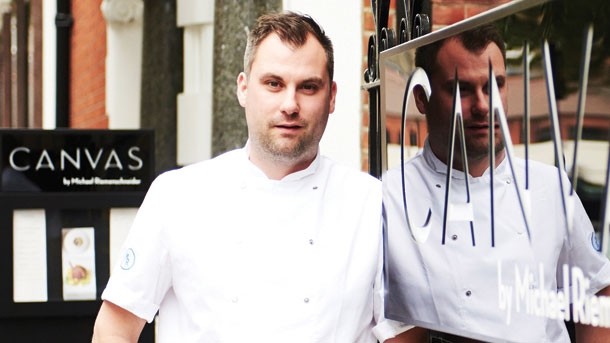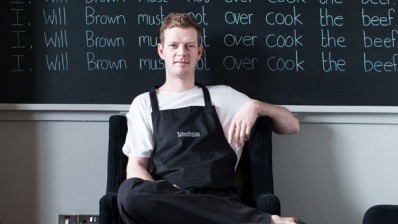Small Talk
Michael Riemenschneider on Canvas Chelsea and the difference between Swiss and French kitchens

Why have you chosen to relocate Canvas from Marylebone to Chelsea?
It’s very simple. We only had 20 covers in the old location and we were fully booked for lunch and dinner. I got offered the former Le Cercle site at 1 Wilbraham Place which is 6,500 sq ft rather than 900 sq ft.
What on earth are you going to do with all that extra space?
We’ve created a chef’s table in the kitchen and a 14-cover private dining room. The restaurant seats 60 and we also have a large bar area.
It sounds expensive…
We were fortunate with the old site as it already had a high-end look when we took it on [it was previously fine dining restaurant Verru]. We didn’t have to spend much. The new space has been more expensive to sort out as there was some building work to do. The rent is higher, but the bar provides an extra revenue stream – it’s already popular with the locals.
Why is your restaurant called Canvas?
Because the menu is a blank canvas for the diner. Customers can choose any of our 16 dishes and build a menu of between one and 16 courses. In doing so they can decide exactly how much they want to eat and how much they want to pay. Prices start at £60 for five courses.
So it’s basically a build-your-own tasting menu?
Yes. Portion size is obviously adjusted depending on the amount of dishes ordered. If people want to come in and have five desserts they’re more than welcome. When I have a tasting menu there’s always something on it I don’t want to eat.
Doesn’t that make things extremely tough on the kitchen?
Any menus over seven courses need to be ordered by the entire table, but we can make adjustments for allergies and intolerances. But yes every single table will have a completely different menu which does make things very challenging for the kitchen and also the front of house staff – especially the sommelier.
And what’s the service like?
We want to casualise fine dining. We don’t have tablecloths and my staff wear jeans. But the service is still immaculate. My GM is Matthew Hough [ex-Hedone] and my sommelier is Alis Jusic. It’s high-end dining at affordable prices, with casual but perfect service.
How would you describe your cooking style?
I’m half German and half Swiss so there are a lot of influences from home. I mainly use ingredients from the British Isles but I still get my pumpernickel bread from Frankfurt. I like to mix the classical with the modern – I think my style is unique.
You trained at some serious kitchens…
I trained at the Lausanne Hotel School [in Switzerland, one of the world’s best hospitality schools]. After that I pretty much just worked under three-star chefs including Philippe Rochat, Alain Ducasse and Pierre Gagnaire.
Is it true about the precise, quiet nature of Sw iss kitchens?
Yes absolutely. French kitchens are fucking nuts by comparison, Gagnaire’s in particular. It’s partly because Swiss – and indeed German brigades – are structured differently. The hierarchy is much stricter so everybody knows what they’re doing. It’s run like the military.
So you got a fair few pans chucked at you in Paris, then…
Not me as I’m 6ft 6. But I certainly saw some flying around. I learnt from it. I don’t treat my brigade in that way. Every single one of my guys has worked with me before, which shows that I’m not an arsehole to work for. It’s very rare for me to lose my rag.
When did you first strike out on your own?
I took over the The Abbey in Penzance in my mid-20s [in 2007]. I got in a very serious team including the former pastry chef at Vendôme [a three Michelin-star restaurant in Germany] and we cooked great food. It was a very exciting time to be in Cornwall as there was a new generation of chefs putting the county on the culinary map, including Kenny Atkinson, Nathan Outlaw and Paul Ripley.
Then you bought Juniper off Paul Kitching…
Yes we took on Juniper [in Altrincham, Cheshire] a few years later. But in early 2009 it all collapsed [both restaurants were forced to close after losing their Michelin stars] and I had a major disagreement with my business partner which ended in the courts. It sounds ridiculous but looking back it was a great experience. They don’t teach you what happens when it goes tits up at hotel school. I now surround myself with people that have the right expertise, not least a good accountant and a lawyer.
And you recently took on the Black Boys Inn, in Hurley …
Yes. I’ve been trying to buy it for years. I live in Bray so it’s convenient, I can pop in on my way home. We’re currently refurbing the letting bedrooms and the communal areas. We grow a lot of the vegetables and herbs for Canvas in the garden. It’s not a gastropub, but the food is very good and the service is friendly and informal.

































